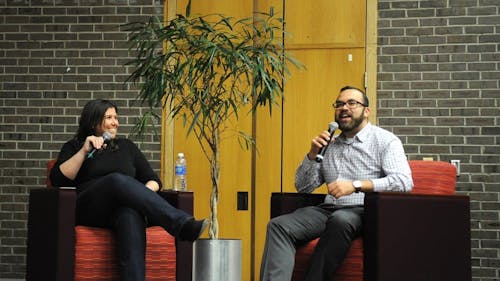Rutgers hosts Gina Trapani for annual Geek Week event

The fifth annual Geek Week’s second day spotlighted Gina Trapani, Lifehacker founder and recognized "geek"'
A celebration of “Geek” culture, Geek Week aims to increase interest and spread awareness on all aspects of “nerd” culture.
It started five years ago as a week in the spring semester, said Carey Loch, director of Major Events and Programs at Student Affairs. Different types of programs and events were provided for students who were interested in "geeky" types of things.
"It was extremely popular, and so we kind of expanded it into a year-long initiative that has different events throughout the course of both semesters and involves students from a variety of different clubs and organizations on campus,” Loch said.
The night’s event was hosted by both the Rutgers University Programming Association and Geek Week staff, involving approximately 15 volunteers in total, she said.
Some notable groups in attendance included Women in Information Technology,and Informatics (WITI) and #stemHERstoryRU, the group responsible for the Science, Technology, Engineering and Mathematics (STEM) campaign photos around the Rutgers campus.
Trapani is the founder and former editor of the Lifehacker blog, as well as the creator of the ThinkUp app. She has been named one of the most influential women in technology. Being both a “geek” and a woman, Trapani was chosen as an inspiration and a showcase of the opportunities available.
Geek Week has a tradition of inviting strong female speakers to Rutgers to speak about various topics in the nerd culture, such as the “Nerd Girl” panel of the previous year, Loch said. Trapani continues this trend.
The event consisted of two parts. It began with a lecture style interview between Trapani and Francisco Zamudio, associate director of New Student Orientation and Family Programs, followed by a question and answer session between Trapani and the audience.
During the lecture portion, Trapani recounted lessons and experiences from her own life and shared them with the audience.
Trapani spoke about her life in the technology field, her beginnings and the new challenges facing students with prospects in the technology industry.
Trapani started with her background. She first encountered a computer at the age of nine, but did not follow-up her interest until college. High school in particular was a “black hole” to her. Even in university she was not a computer major, she said.
“I was an English major. I wanted to be a poet or a novelist. I wasn’t really sure what I wanted to do as an undergraduate,” Trapani said.
While trying to find paid work, Trapani sought a job at the computer lab at Marist College and was accepted.
It was this job that led to her love of computers, leading her to declare a computer science minor and later earn a Master’s degree in computer science. Trapani said she did not choose computers as a profession until her graduate studies.
Throughout her background story, Trapani stressed the point that she did not have a definite plan of her future. She assured the audience that such activity was both “normal” and likely, she said.
Trapani recounted anecdotes of her experience as an independent contractor during the “dotcom” era of the early 2000s, working “for hourly rates and charging a ridiculous sum of money,” she said. The “dotcom” bubble was effectively ended after the September 11 attacks and Trapani first experienced the loss of job security.
It was soon after that she joined Lifehacker, a blog setup by a former supervisor of hers. Having had previous blogging experience during her contracting time, she became its first blogger. The blog became a guide on “lifehacks,” or efficient online shortcuts.
During the heyday of the site, Trapani mentioned that sometimes she would write several pages of content per day, taking up to 10 hours at a time. She also learned the difference between “good and popular,” as she discussed the practice of spreading out material over several pages to increase website traffic.
After some time, Trapani left Lifehacker to once again devote herself to programming, as she became “tired of writing about the amazing things other people have done, instead of doing them myself,” she said.
In subsequent years, Trapani would create ThinkUp, a social media app, as well as Makerbase, a database similar to the IMDb database for movies and TV shows, except for websites and apps instead.
Trapani spoke about the challenges in the modern technological world.
A large part of her success stemmed from the fact that the internet was new at the time, she said. Had she started in the current time period, it is more likely that she would have been a Youtube star instead of a blogger.
Samantha Garcia, a School of Arts and Sciences junior, is not a computer science major, but still had a positive view of the night.
“It was cool hearing about someone in college who didn’t know what they were doing and somehow figured it out,” Garcia said.
Jonathan Xiong is a School of Arts and Sciences sophomore majoring in biology. He is a contributing writer for The Daily Targum. See more on Twitter @ra567.



